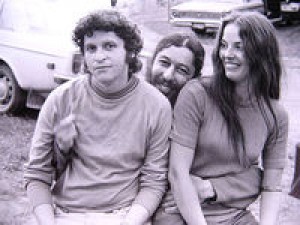Paul Krassner's latest collection, "Who's to Say What's Obscene: Politics, Culture & Comedy in America Today" (foreword by Arianna Huffington), and other books by him, plus the Disneyland Memorial Orgy poster, are available at his website, paulkrassner.com.He calls himself an investigative...
show more
Paul Krassner's latest collection, "Who's to Say What's Obscene: Politics, Culture & Comedy in America Today" (foreword by Arianna Huffington), and other books by him, plus the Disneyland Memorial Orgy poster, are available at his website, paulkrassner.com.He calls himself an investigative satirist. Don Imus labeled him "one of the comic geniuses of the 20th century." (Imus has since apologized for that quote.) And, according to the Los Angeles Reader, "Krassner delivers 90 minutes of the funniest, most intelligent social and political commentary in town."On the other hand, a couple of FBI agents went to one of his performances and stated in their report, "He purported to be humorous about government policies." His FBI files indicate that after Life magazine published a favorable profile of him, the FBI sent a poison-pen letter to the editor, complaining: "To classify Krassner as a social rebel is far too cute. He's a nut, a raving, unconfined nut.""The FBI was right," says George Carlin. "This man is dangerous--and funny; and necessary."ABC newscaster Harry Reasoner wrote in his memoirs, "Krassner not only attacks establishment values; he attacks decency in general." So Krassner named his one-person show Attacking Decency in General, receiving awards from the L.A. Weekly and DramaLogue. He is the only person in the world ever to win awards from both Playboy (for satire) and the Feminist Party Media Workshop (for journalism). When People magazine called Krassner "Father of the underground press," he immediately demanded a paternity test. Actually, he had published The Realist magazine from 1958 to 1974. He reincarnated it as a newsletter in 1985. "The taboos may have changed," he wrote, "but irreverence is still our only sacred cow." The final issue was published in Spring 2001.His style of personal journalism constantly blurred the line between observer and participant. He interviewed a doctor who performed abortions when it was illegal; Krassner then ran an underground abortion referral service. He covered the antiwar movement; then co-founded the Yippies with Abbie Hoffman and Jerry Rubin (writing a few animated re-enactment scenes for the documentary "Chicago 10" four decades later). He published material on the psychedelic revolution; then took LSD with Tim Leary, Ram Dass and Ken Kesey, later accompanying Groucho Marx on his first acid trip.He edited Lenny Bruce's autobiography, How to Talk Dirty and Influence People, and with Lenny's encouragement, became a stand-up comic himself, opening at the Village Gate in New York in 1961. Ten years later--five years after Lenny's death--Groucho said, "I predict that in time Paul Krassner will wind up as the only live Lenny Bruce." He was nominated for a 2005 Grammy Award in the Album Notes category for his 5,000-word essay accompanying a 6-CD package, Lenny Bruce: Let the Buyer Beware. Krassner rarely works the comedy-club circuit, preferring to perform on campuses, at theaters and in art galleries. He has been a guest on Late Night with Conan O'Brien and Politically Incorrect with Bill Maher; on Air America Radio with Janeane Garofalo and with Marc Maron. He hosted his own radio call-in show in San Francisco.Paul writes columns for High Times, AVN, CarnalNation.com, and is an occasional contributor to the Huffington Post. His articles have appeared in Rolling Stone, Spin, Playboy, Penthouse, Mother Jones, the Nation, New York, National Lampoon, Utne Reader, the Village Voice, the San Francisco Chronicle, the Los Angeles Times, the L.A. Weekly, New York Press, and Funny Times.His venues have ranged from the New Age Expo to the Skeptics Conference, from a Neo-Pagan Festival to the L.A. County Bar Association, from a Swingers Convention to the Brentwood Bakery, where members of the audience were each given a free pastry of their choice. Over the years, he has built up a cult following that has steadily been edging into mainstream awareness.His reviews have been highly complimentary. The New York Times: "He is an expert at ferreting out hypocrisy and absurdism from the more solemn crannies of American culture." The Los Angeles Times: "He has the uncanny ability to alter your perceptions permanently." The San Francisco Examiner: "Krassner is absolutely compelling. He has lived on the edge so long he gets his mail delivered there."He was head writer for an HBO special satirizing the 1980 presidential election campaign, did on-air commentary for the Fox network's Wilton-North Report, and a decade later was a writer on Ron Reagan's late-night TV talk show.Mercury Records released his first two comedy albums, We Have Ways of Making You Laugh and Brain Damage Control. Artemis Records released his next four: Sex, Drugs and the Antichrist: Paul Krassner at MIT, Campaign in the [Buttocks; change from A-s required by Amazon] , Irony Lives! and The Zen Bastard Rides Again.His autobiography, Confessions of a Raving, Unconfined Nut: Misadventures in the Counter-Culture, published by Simon & Schuster, sold 30,000 copies. New World Digital is publishing an online, expanded edition.His other books include: The Winner of the Slow Bicycle Race: The Satirical Writings of Paul Krassner, with an introduction by Kurt Vonnegut; a trilogy of anthologies--Pot Stories For the Soul, with an introduction by Harlan Ellison, Psychedelic Trips For the Mind and Magic Mushrooms and Other Highs: From Toad Slime to Ecstasy--Sex, Drugs and the Twinkie Murders: 40 Years of Countercultural Journalism; Impolite Interviews; Murder At the Conspiracy Convention and Other American Absurdities, with an introduction by George Carlin; and One Hand Jerking: Reports From an Investigative Satirist, with a foreword by Harry Shearer and an introduction by Lewis Black.At the 14th annual Cannabis Cup in Amsterdam, Paul Krassner was inducted into the Counterculture Hall of Fame--"my ambition," he claims, "since I was three years old." In May 2004, he received an ACLU Uppie (Upton Sinclair) Award for dedication to freedom of expression.
show less

